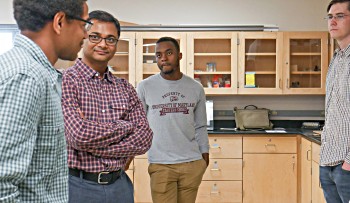
Dr. Kausik Das will share his research as an invited speaker this month at two prestigious New England institutions. He will be the Charles C. Jones Seminar speaker for the Thayer School of Engineering at Dartmouth College in Hanover, New Hampshire, on October 29. The next day, he will present a 2 p.m. symposium at the Massachusetts Institute of Technology in Cambridge, Massachusetts, as the guest speaker for the department of mechanical engineering.
“It’s an honor to join the slate of who’s who in science and technology that have presented Jones seminars before. It would be thrilling to showcase UMES students’ achievements to a broader academic community at the highest level,” Das said.
Das will present, “Fostering Critical Thinking and Innovation—A Design Thinking Approach,” at the 3:30 p.m. engagement at Dartmouth. Getting involved in the process of an authentic discovery can be transformative for undergraduate students unsure about becoming a scientist, Das said. Modern frontline research and discoveries increasingly need an interdisciplinary approach usually not offered in department-based courses. To develop an innovative mindset, he said, students often need a roadmap involving development of critical thinking abilities, hands-on active learning skills, followed by intense curiosity driven capstone research.
The seminar discussion involves outlining a “holistic student development model that starts in the classrooms using custom made cartoon clicker questions to enhance student engagement and real time feedback, followed by guided, discovery-based labs and finally, immersive modular interdisciplinary research projects.” Das will also discuss some of the recent discoveries and research milestones made by undergraduates in his research lab at UMES, including plasma generation using a kitchen microwave oven to the dynamics of rotating solid bodies in zero gravity.
Hosted by a colleague, Dr. Aaron Persad, a research scientist in MIT’s Microfluidics and Nanofluidics Research Laboratory, Das will present, “Microwave Plasma to Passive Microfluidic Mixing and Solid Body Rotation in Zero-g: Connecting the Dots,” on October 30. His discussion will relay how an ordinary kitchen microwave can create controlled plasma in a jar. Das will discuss the physics of the process, its characterization and applications, such as soft microfluidics. He will share recent results of passive microfluidic mixing, where low Reynolds number mixing was achieved by manipulating boundary conditions. Das will also cover how the hypothesis of microwave plasma generation mechanism led his research team to build a payload to study solid body rotation in zero gravity.
Both seminars are free and open to the public as optional Zoom meetings. Click HERE for the Jones seminar on Oct. 29, 3:30 p.m. (Meeting ID: 937 2623 1106, Passcode: 705990)and HERE for the MIT seminar on Oct. 30, at 2 p.m. Contact Das at kdas@umes.edu for more information.
Das’ teaching and research are supported by the National Science Foundation (HBCU-UP Award #1719425), the Department of Education (MSEIP Award #P120A70068) with a MSEIP CCEM grant, and the Maryland Technology Enterprise Institute through a MIPS grant.
Gail Stephens, agricultural communications, University of Maryland Eastern Shore, School of Agricultural and Natural Sciences, gcstephens@umes.edu, 410-621-3850.

